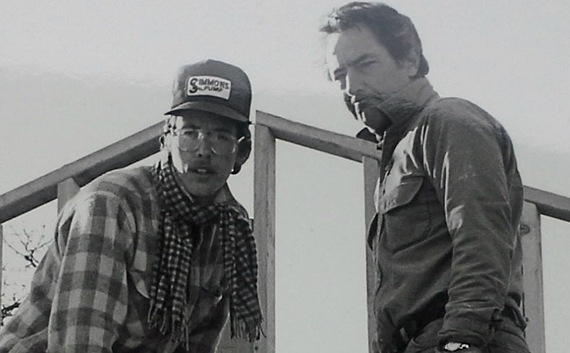My psychotherapy practice is predominantly composed of grown men who are still trying in one way or another to live up to their fathers' implicit and explicit expectations of who they should have become, of that subtle chronic "not good-enough" feeling that lurks just beneath the surface of any child who has had an emotionally withholding or in some way emotionally or physically "abusive" parent. This sensation rarely abates; feelings of discontent, loneliness and the thirst for loving, positive, accepting role models is seldom quenched.
Sam Keen and his son Gifford have written a sequel to Sam's epic and bestselling "Fire in the Belly," the book that defined what it meant to be "a full-summed and spirited man." In "Prodigal Father Wayward Son: A Roadmap to Reconciliation" Sam and Gifford continue the quest for the source of male personal identity, rejecting the older notion of formal rites of initiation in which sons are invested with tribal myths and identity by the old men of the tribe; instead they insist that fathers and sons bond by the repertoire of the stories they share with each other. For we are storytelling animals and thus learn who we are by recounting and listening to stories.
"Prodigal Father Wayward Son: A Roadmap to Reconciliation" is a series of stories/reframings told by Gifford and Sam in alternating chapters. The beginning of the book exposes both men's most painful childhood memories - I found some of the episodes almost too painful to read and had to put the book down on at least one occasion. However, the recounting of these stories also shows how a handful of interludes can warp the lenses through which father and son see each other. As Gifford writes to Sam, "Like a bad habit or an addiction, these few harsh images stood sentinel at the entryway to memory and experience, restricting my responses to you to a very narrow range."
Once the unconscious myths that poisoned their relationship are exposed, Sam and Gifford branch out into unexplored territory, narrating the unshared stories of how they came to be the men they are. In the end, this leads to remarkable acts of forgiveness and reconciliation.
The prescription is daunting, but it seems both profound and obvious that authentic sharing of our narratives is a precondition to reconciliation. As Gifford says to Sam, "Should you say you forgive, but can not recognize the depths of the wounds - the cruelty given and received - then the profession of forgiveness rings hollow."
Following the Keen's prescription, it is clear they are demonstrating a method for resolving longstanding, intractable differences, not only between fathers and sons, but for all intimate relationships. By revealing their primal desires to be heard, Sam and Gifford Keen display for us a simple yet often precarious way to untangle the wounds of childhood and forge a bond of understanding, acceptance, and intimacy whose only name is "love."

